- Details
- Category: Industry News
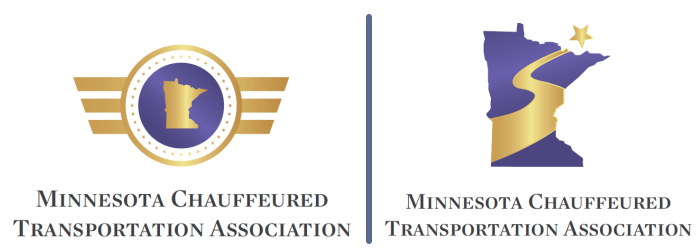 Minneapolis — In its efforts to better satisfy members’ requests, the Minnesota Chauffeured Transportation Association (MCTA) debuted regular Happy Hour sessions last month, tabulated the results of its 2017 membership survey, and has compiled legislative updates relevant to the transportation industry.
Minneapolis — In its efforts to better satisfy members’ requests, the Minnesota Chauffeured Transportation Association (MCTA) debuted regular Happy Hour sessions last month, tabulated the results of its 2017 membership survey, and has compiled legislative updates relevant to the transportation industry.
The Happy Hours debuted May 1 at MCTA President Len Nelson’s Valley Limo facility in Burnsville. The get-togethers aim to facilitate camaraderie and the sharing of expertise among members and prospective members alike in a casual environment.
The 2017 MCTA Membership Survey provided anonymous feedback from members regarding the direction they would like to see the association take, priorities it should consider, and even what the new MCTA logo should be.
The survey results, which will be addressed when the MCTA next meets, reflect a general acceptance of the current annual dues and the ways they’re used to provide membership value, as well as members’ overall satisfaction. They also ranked top political issues from most to least concerning (minimum wage increases, general MnDOT issues, TNCs, MAC issues—all of which MCTA Administrative Staff Leslie Rosedahl indicated as being “very close in ranking”) while highlighting suggestions for speakers, such as Senate Transportation Chairperson Steve Murphy and the Insurance Commissioner for the Minnesota Department of Commerce.
The association has also supplied updates about numerous legislative session outcomes:
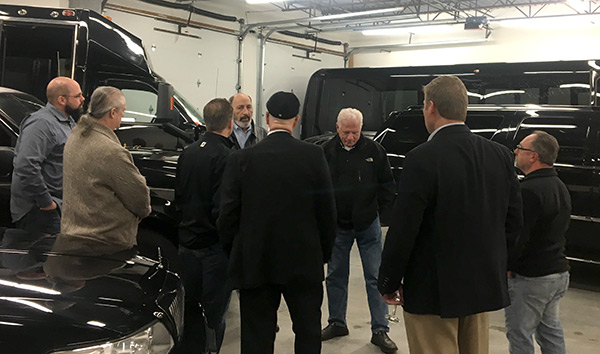 MCTA current and prospective members alike met up at President Len Nelson’s Valley Limo facility last month Budget Bills
MCTA current and prospective members alike met up at President Len Nelson’s Valley Limo facility last month Budget Bills
The 2017 Minnesota Legislative Session concluded at the end of May; Governor Mark Dayton announced his decisions on final bills soon after. All state budget bills were signed, avoiding a July 1 government shutdown. But Gov. Dayton line-item vetoed the Minnesota House and Senate operations budget in an attempt to both force legislature into a special session and renegotiate some policy items that were in the newly signed budget bills. It’s anticipated that the legislative funding issue will be fought next in the courts and a potential special session won’t happen soon, if at all, since the House and Senate are controlled by Republican majorities and the governor is a Democrat.
Pre-emption
Gov. Dayton announced his veto of pre-emption, or uniform statewide labor standards. The bill also included some of the governor’s priorities about parental leave for state employees, a pension fix for unions, and funding for “wage theft” issues, all of which he vetoed collectively, accompanied by an unhappy letter. Safe and sick leave in St. Paul and Minneapolis will proceed as planned, as will the effort to raise minimum wage in Minneapolis.
Minneapolis Minimum Wage
The City of Minneapolis staff issued a report and their recommendations on minimum wage to City Council, which the council largely adopted. The proposed ordinance increases minimum wage to $15/hour tied to inflation, with no tip credit (or other carve outs-for non-profits or healthcare staff), a training wage of 85 percent for the first 90 days, and a recommended three tiers of business sizes for phase in purposes.
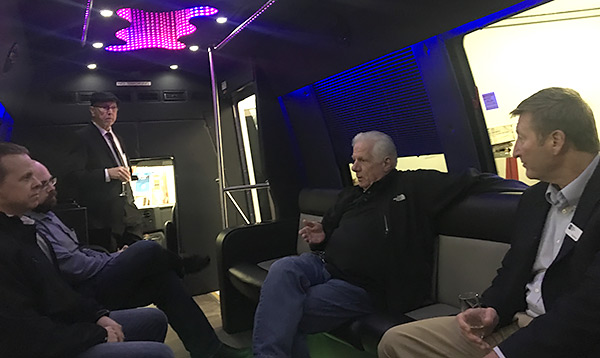 One of MCTA Len Nelson’s fleet vehicles provided a casual place to chat during the May debut of MCTA’s Happy Hours The plan also calls for covering anyone working in Minneapolis, regardless if the business employing them is actually based in Minneapolis: If your drivers are picking up and dropping off in Minneapolis, this could pertain to you! While this specific provision was thrown out by the courts in safe and sick leave—and now that provision only requires coverage for businesses who have a nexus/are based physically in Minneapolis–the city is proceeding with all employee coverage for now. According to Rosedahl, the details of these issues will be debated over the next month, along with proposed amendments. A final vote will take place at the June 30 City Council meeting. The effective date is still undecided.
One of MCTA Len Nelson’s fleet vehicles provided a casual place to chat during the May debut of MCTA’s Happy Hours The plan also calls for covering anyone working in Minneapolis, regardless if the business employing them is actually based in Minneapolis: If your drivers are picking up and dropping off in Minneapolis, this could pertain to you! While this specific provision was thrown out by the courts in safe and sick leave—and now that provision only requires coverage for businesses who have a nexus/are based physically in Minneapolis–the city is proceeding with all employee coverage for now. According to Rosedahl, the details of these issues will be debated over the next month, along with proposed amendments. A final vote will take place at the June 30 City Council meeting. The effective date is still undecided.
Sick and Safe Leave
Sick and safe mandates go into effect July 2017 for St. Paul and Minneapolis. There is a two-tier effective date specifically in St. Paul: Businesses with 24 or more employees in St. Paul must comply by July 1, 2017, while businesses with fewer than 24 employees have until July 1, 2018, to comply. Minneapolis also has two tiers: five employees or fewer and six or more, with both part- and full-time staff considered employees.
Additional St. Paul details can be found at goo.gl/hG0Vos and Minneapolis’ details can be reviewed at goo.gl/wmB5QN.
The next MCTA meeting date is currently being finalized.
Visit mnlimo.org for more information.
[CD0617]
- Details
- Category: Industry News
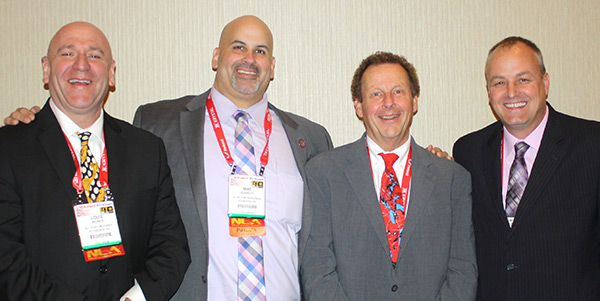 L to R: Louis Weiner of All Star Worldwide Transportation, Michael Barreto of Flyte Tyme Worldwide, Philip Jagiela of PALM Association Management and Consulting, and Douglas Rydbom of Premiere #1 LimousineHarrisburg, Pa. — The United Passenger Transportation Association of Pennsylvania (UPTAPA) held its inaugural meeting May 31 at the Holiday Inn Harrisburg East. A robust group of members from the livery, school bus, ambulance/paratransit, and motorcoach industries helped kick off the debut meeting of this statewide association. The luncheon served as an opportunity to introduce the organization and its founders, while identifying goals for the short and long term.
L to R: Louis Weiner of All Star Worldwide Transportation, Michael Barreto of Flyte Tyme Worldwide, Philip Jagiela of PALM Association Management and Consulting, and Douglas Rydbom of Premiere #1 LimousineHarrisburg, Pa. — The United Passenger Transportation Association of Pennsylvania (UPTAPA) held its inaugural meeting May 31 at the Holiday Inn Harrisburg East. A robust group of members from the livery, school bus, ambulance/paratransit, and motorcoach industries helped kick off the debut meeting of this statewide association. The luncheon served as an opportunity to introduce the organization and its founders, while identifying goals for the short and long term.
UPTAPA Executive Director Philip Jagiela, who also serves as CD Industry & Brand Ambassador, called the meeting to order by welcoming the group and offering some background into the association’s concept. After emphasizing the value of a statewide industry, Jagiela then introduced UPTAPA’s co-founders: Michael Barreto of Eagle Chauffeured Services, Doug Rydbom of Premiere #1 Limousine, and Louis Weiner of All-Star Worldwide Transportation.
Barreto was next to address the room, asking each person in attendance to introduce themselves and identify the segment of the industry they represent. He then shared some of the immediate objectives of UPTAPA, including the creation of support committees and establishing a PAC, all the while stressing that there is no desire to dilute the efforts of other associations in Pennsylvania.
Next, Rydbom took the floor, echoing many of the same sentiments as Barreto. The Lancaster-area operator then solicited for potential board members, and encouraged those present to visit the UPTAPA website and apply for membership. Rydbom also made a point of explaining that education will be the key component of meetings and communication between regions will be encouraged. He pointed out that unique sponsorship opportunities are open for companies and vendors.
A short Q&A was next, with many sharing their support for the concept of a statewide association. Vendor member Eric Coolbaugh from Access Commercial Capital was enthusiastic about the efforts made by the founders, sharing his appreciation for the cohesive work environment and the belief that UPTAPA is beneficial to the industries involved.
Jagiela closed the meeting by promoting the UPTAPA website and encouraged attendees to contact him with any needs or questions.
The next UPTAPA meeting is scheduled for Wednesday, July 26, in the Philadelphia region.
Visit uptapa.org for more information.
[CD0617]
- Details
- Category: Industry News
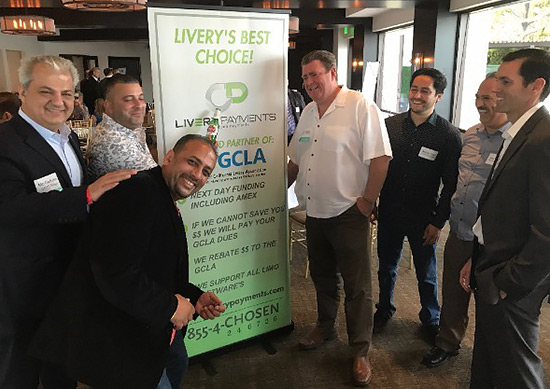 GCLA members at a recent association meeting in San Diego After taking its meetings on the road throughout The Golden State last year, Greater California Livery Association (GCLA) continues to test out new approaches to its meeting as it explores methods for best reaching its geographically far-reaching members.
GCLA members at a recent association meeting in San Diego After taking its meetings on the road throughout The Golden State last year, Greater California Livery Association (GCLA) continues to test out new approaches to its meeting as it explores methods for best reaching its geographically far-reaching members.
Last summer’s unveiling of a hyper-local series that brought association events to key regions and cities to engage members closer to home was a success, so the association is continuing along that path—but with additional tweaks to accommodate the conversations that members want to have at a gathering of their peers.
“We are testing out new events formats, so now it’s like a real mini trade show where there’s no dedicated speakers,” Executive Director Tom Garrett said, adding that the format has been well-received at recent meetings in both San Diego and Los Angeles. “People come in and they get a drink and some food, they network, we have a row of vendors doing demos, we have vehicles on display, and then we have featured guests from the airport or the PUC answering specific questions. It’s been going really well. This new format has done a lot to bring people together and build a community, which is our main mission.”
According to Garrett, streamlining presentations into one prevailing topic helps keep attendees’ tuned into news they can actually use, rather than covering a range of topics in one meeting that aren’t applicable to the widest swath of members.
This new format has already allowed for specific topics to be addressed, such as a representative from LAX discussing airport construction and how to handle its impact on client pick-ups and drop-offs at the L.A. hub.
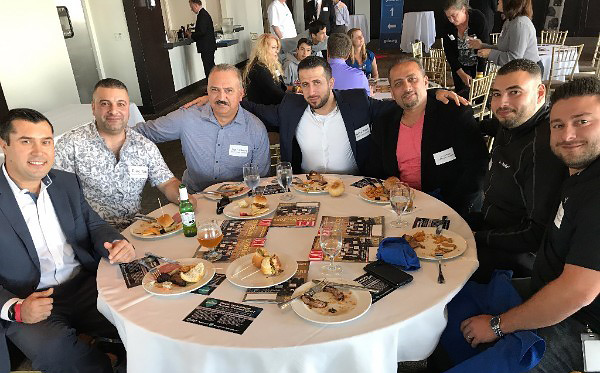 The new GCLA meeting format aims to strengthen its members’ sense of community Tonight’s meeting in San Francisco at the Embassy Suites-SFO Waterfront will similarly facilitate intimate conversations to exchange information: PUC Director of Enforcement Nick Zanjani, the landside manager of the San Francisco International Airport, and Harish Paaji of Bay Area Limo Repair will all be at one table where they can talk directly to operators who are looking to have either their feedback heard or their questions answered.
The new GCLA meeting format aims to strengthen its members’ sense of community Tonight’s meeting in San Francisco at the Embassy Suites-SFO Waterfront will similarly facilitate intimate conversations to exchange information: PUC Director of Enforcement Nick Zanjani, the landside manager of the San Francisco International Airport, and Harish Paaji of Bay Area Limo Repair will all be at one table where they can talk directly to operators who are looking to have either their feedback heard or their questions answered.
This also allows the GCLA to focus on the quality of its meetings instead of worrying about the details of planning an event.
“We’re dialing back the production: We really just need a room where people can get together with other operators and vendors,” Garrett explains. “They just need a place where they can get together and talk like they want to so they can exchange the information they need.”
As members’ priorities have shifted away from the ins and outs of dealing with TNCs and have settled on the more immediate issue of profitability, GCLA is adapting to offer its members the advice it needs to navigate a tough market.
“There isn’t really any clarity as to how to regain margin or volume, so people are looking to merge or sell or evolve their business, and they’re looking to us for help,” says Garrett.
To be of immediate assistance to its members, the association still manages the GCLA Hotline and Mentorship Program it introduced last year, where any questions will be addressed within 72 hours.
GCLA’s next meeting is in San Francisco tonight, then it heads to Santa Ana June 20.
Visit gcla.org for more information.
[CD0617]

